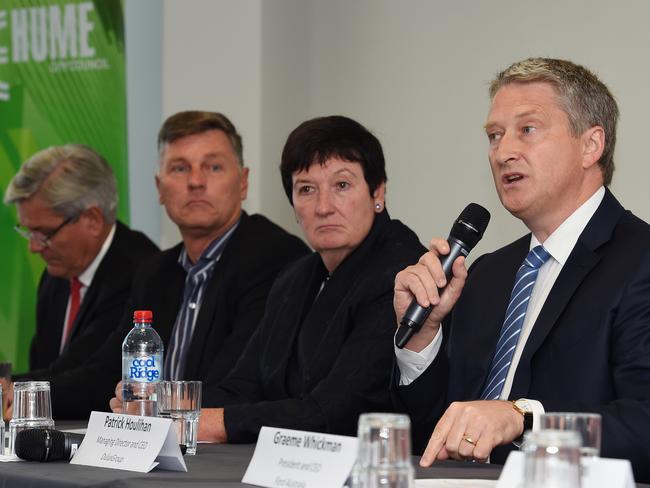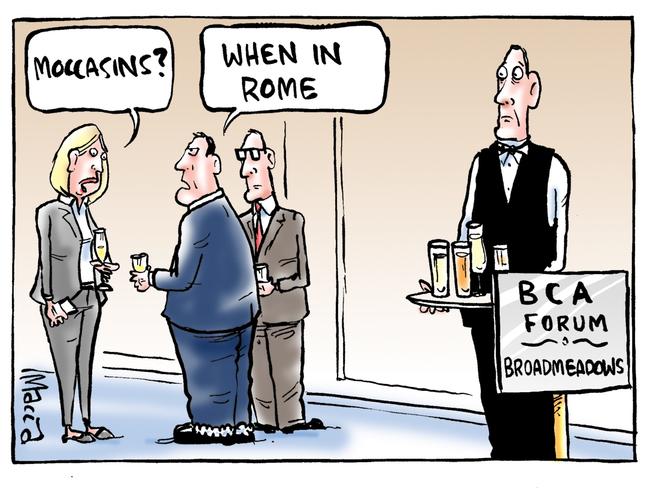BCA forum told exorbitant energy costs holding manufacturing back
ENERGY prices are “out of control” and have emerged as the most critical headwind facing Australian manufacturers, according to the chief of paint maker DuluxGroup.
Business
Don't miss out on the headlines from Business. Followed categories will be added to My News.
ENERGY prices are “out of control” and have emerged as the most critical headwind facing Australian manufacturers, according to the chief of paint maker DuluxGroup.
Patrick Houlihan says manufacturing remains “well and truly alive” in Australia, but soaring electricity and gas prices mean the sector is “kicking against the breeze” at a time when it needs to be globally competitive.
SIEMENS BOSS SAYS AUSTRALIA CAN BENEFIT FROM ROBOTICS, ARTIFICIAL INTELLIGENCE
BUSINESS COUNCIL MAKES COMPANY TAX CUT PAY RISE PLEDGE
Speaking at a Business Council of Australia event in Broadmeadows on Thursday, Mr Houlihan said it was crazy an energy-rich nation such as Australia had been saddled with such high prices. “The cost of energy in this country is out of control,” he said.
“There is lots of politics, it’s very complicated and I don’t profess to understand it, but we need to find the middle ground ... there has been a breakdown in market structure.”
“When I think about manufacturing for this country, more than anything else our energy costs underpin our competitiveness.
“We are one of the most energy-rich countries in the world, so common sense says it’s crazy what we are paying for energy.”
Mr Houlihan made the comments at a high-profile panel discussion organised in Victoria’s traditional manufacturing heartland by the BCA, Sky News and News Corp, publisher of the Herald Sun.
SURGING POWER COSTS HURTING VICTORIAN MANUFACTURERS

About 170 people gathered to hear and question a group of the nation’s business leaders, including Siemens Australia and New Zealand chief Jeff Connolly, Ford Australia president Graeme Whickman, BCA chief Jennifer Westacott and Mr Houlihan.
Kangan Institute executive director of studies Angie Taras and Australian Performance Vehicles managing director Harry Hickling were also part of the panel.
The forum — one of 10 being hosted around the country as part of a Strong Australia campaign — was moderated by Sky News political editor David Speers.
Mr Houlihan said Dulux had invested $165 million opening a new paint factory in Melbourne’s northern suburbs, from which it exported to the world.
“People talk about manufacturing dying and being less relevant in the economy, but one million Australians are employed in manufacturing,” he said.
“Manufacturing is certainly well and truly alive, although we are kicking against the breeze.”
Mr Connolly said Australia’s electricity market was too opaque around its cost structures.
He said while electricity generation received a lot of public attention, much of the cost in bills was generated by the distribution side of the business.
“There is way too much discussion in Australia about what we are going to burn to generate the power,” he said.

“The real issue is how opaque it is at the power station, through transmission, through distribution and what’s going on in the retail market ... we have not really got a competitive situation there that self regulates.”
Mr Connolly said Australia was unlikely to return to the era when it enjoyed electricity and gas prices that were cheaper than its global rivals.
As such, it should spend a lot more time working out how to use energy more efficiently, he said.
“We’ve reached a new norm in the price — the question is how do we use less?”
Mr Whickman said despite Ford no longer building vehicles in Australia, the nation still played a key role as a global design and testing hub and continued to employ more than 2000 people.
“We export ideas now,” he said.
“We engineer vehicles and they are seen on the roads of 200 plus countries.”
The next Strong Australia forum will be in western Sydney next month, followed by Hobart in June.
Victoria will host another of the forums at Geelong in November.



